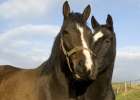Veterinary scientists find way of killing equine sarcoid tumour cells

(PhysOrg.com) -- Veterinary researchers at the University of Glasgow have succeeded in killing equine sarcoid cells by silencing genes in the virus which cause tumours on horses.
The team at the Faculty of Veterinary Medicine, led by Prof Lubna Nasir, a specialist in comparative oncology, are now hoping to obtain funding for clinical trials using the new technique.
Sarcoids are skin tumours caused by infection with the Bovine Papillomavirus (BPV). They are the most common type of tumour found in horses - the estimated prevalence in the UK is 6-7 per cent.
Although the disease is rarely life-threatening, many horses with sarcoids are euthanised because the condition is untreatable or because the horse is unsellable. Currently there is no universally effective treatment for sarcoids and if treatment fails the sarcoids will often come back worse.
The breakthrough by the Glasgow scientists, funded with £159,000 from The Horse Trust, offers a potential treatment for horses affected by sarcoids.
The researchers found that by inhibiting the activity of a particular viral protein within sarcoid cells, the amount of viral DNA in the cells reduced. This led to a reduction in the growth of the sarcoid cells and caused the cell to die by programmed cell-death (PCD). The researchers believe that PCD occurs because the sarcoid cells become reliant on the virus.
Prof Nasir said: "This could potentially be a major breakthrough in the treatment of sarcoids. We are now seeking funding to use this technique in clinical trials on horses that have sarcoids."
The research team inhibited the activity of a viral protein called E2, which is needed by BPV to replicate. They used a novel approach termed 'gene silencing' to suppress the activity of the gene that codes the E2 protein. The research was carried out in vitro on fibroblast cells, which had been cultured from sarcoid tissue removed from animals during surgery.
As this research was carried out in vitro, the researchers will now need to see if they can replicate the results in vivo, by developing a way of targeting the sarcoid cells in horses.
"One of the challenges with gene silencing is administering it within clinical setting - as you need to get molecules into every cell. As sarcoids are on the surface of a horse, we think administration should be relatively easy - potentially by injecting or applying a cream to the sarcoid," said Professor Nasir.
"If we are able to successfully develop this technique it would be a non-toxic and easy to administer treatment for horses affected by this distressing condition."
Prof Nasir's research could also have an impact on the treatment of lesions in cattle, which are also caused by BPV. Around 50% of cattle in the UK are estimated to have lesions. It may also help with the treatment of Human Papillomavirus (HPV) infections in humans. HPV, which is similar to BPV, can lead to various cancers in humans including cervical and vaginal cancer.
The Horse Trust is keen to fund the next stage of Prof Nasir's research, but a reduction in funding during the credit crunch has forced the charity to suspend its grant programme, although it is continuing to fund research and educational grants made in earlier years using its reserves.
Provided by University of Glasgow



















